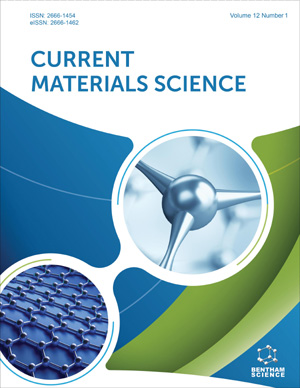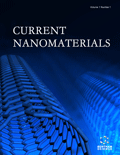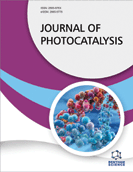Abstract
Polysaccharides from marine sources have been increasingly used in recent research due to their availability, affordability, biocompatibility, and biodegradability. These features make them promising candidates for use in nanotechnology in a wide variety of drug delivery systems, including those for gene therapy, tissue engineering, cancer therapy, wound dressing, biosensors, and water purification. Marine polysaccharides are of particular interest due to their distinct physicochemical and biological properties like chitin, alginate, carrageenan, fucoidan, and chitosan has inspired an array of nanostructures. This article summarizes the history, chemical composition, biological functions, and nanomedical uses of these marine polysaccharides. Marine polysaccharides are the topic of this review due to their potential utility in gene transfer.
[http://dx.doi.org/10.1016/j.cub.2012.09.036] [PMID: 23159596]
[http://dx.doi.org/10.1016/j.copbio.2016.02.021] [PMID: 26954946]
[http://dx.doi.org/10.1016/j.drudis.2010.09.002] [PMID: 20869461]
[http://dx.doi.org/10.3390/md12021066] [PMID: 24549205]
[http://dx.doi.org/10.3390/md14020034] [PMID: 26861358]
[http://dx.doi.org/10.1038/nrd2487] [PMID: 19096380]
[http://dx.doi.org/10.1016/j.cbpa.2008.03.016] [PMID: 18423384]
[http://dx.doi.org/10.1007/s00253-009-2233-z] [PMID: 19760178]
[http://dx.doi.org/10.3390/md11030700] [PMID: 23528949]
[http://dx.doi.org/10.1039/c0np00008f] [PMID: 20922218]
[http://dx.doi.org/10.1016/j.jddst.2015.09.004]
[http://dx.doi.org/10.3390/md12126014] [PMID: 25522314]
[http://dx.doi.org/10.3390/md8092435] [PMID: 20948899]
[http://dx.doi.org/10.1016/j.jconrel.2003.09.013] [PMID: 14684267]
[http://dx.doi.org/10.1038/35044177] [PMID: 11100710]
[http://dx.doi.org/10.1016/S0065-2660(05)54001-X] [PMID: 16096005]
[http://dx.doi.org/10.1038/gt.2012.20] [PMID: 22402323]
[http://dx.doi.org/10.1038/43977] [PMID: 10524611]
[http://dx.doi.org/10.1038/sj.gt.3302039] [PMID: 12756417]
[http://dx.doi.org/10.3390/md14030042] [PMID: 26927134]
[http://dx.doi.org/10.3390/md13052967] [PMID: 25988519]
[http://dx.doi.org/10.1016/j.addr.2013.05.002] [PMID: 23680381]
[http://dx.doi.org/10.1201/9781420030822]
[http://dx.doi.org/10.1016/j.carbpol.2012.10.036] [PMID: 23399156]
[http://dx.doi.org/10.1039/C1CS15239D] [PMID: 22085917]
[http://dx.doi.org/10.1016/j.addr.2008.09.001] [PMID: 18848591]
[http://dx.doi.org/10.1080/10408690490478091] [PMID: 16047493]
[http://dx.doi.org/10.1016/j.addr.2013.04.016] [PMID: 23639519]
[http://dx.doi.org/10.1016/j.addr.2013.07.005] [PMID: 23872012]
[http://dx.doi.org/10.1186/s40659-016-0093-4] [PMID: 27378167]
[http://dx.doi.org/10.1016/j.jconrel.2014.05.014] [PMID: 24845128]
[http://dx.doi.org/10.3390/md11061961] [PMID: 23752353]
[http://dx.doi.org/10.1177/088391159200700406]
[http://dx.doi.org/10.1016/j.matchemphys.2010.02.026]
[http://dx.doi.org/10.3390/md13031133] [PMID: 25738328]
[http://dx.doi.org/10.1002/adem.200700355]
[http://dx.doi.org/10.1016/j.ejpb.2012.04.007] [PMID: 22561955]
[http://dx.doi.org/10.1016/S1381-5148(00)00038-9]
[http://dx.doi.org/10.1016/j.carbpol.2008.11.002]
[http://dx.doi.org/10.1016/j.progpolymsci.2006.06.001]
[http://dx.doi.org/10.1016/j.progpolymsci.2009.04.001]
[http://dx.doi.org/10.1002/pola.20176]
[http://dx.doi.org/10.1039/c003583a]
[http://dx.doi.org/10.1039/c2gc36582k]
[http://dx.doi.org/10.1021/acssuschemeng.8b03269]
[http://dx.doi.org/10.1016/j.ijbiomac.2011.11.007] [PMID: 22108289]
[http://dx.doi.org/10.1080/00222341003595634]
[http://dx.doi.org/10.1016/j.carbpol.2019.02.027] [PMID: 30824097]
[http://dx.doi.org/10.1039/C8CP02749H] [PMID: 30059116]
[http://dx.doi.org/10.1166/jbmb.2013.1393]
[http://dx.doi.org/10.1039/C2NR30383C] [PMID: 22539071]
[http://dx.doi.org/10.1039/c3gc41060a]
[http://dx.doi.org/10.1016/j.biotechadv.2009.11.001] [PMID: 19913083]
[http://dx.doi.org/10.1016/j.snb.2008.12.021]
[http://dx.doi.org/10.1039/b517297g]
[http://dx.doi.org/10.1016/B978-0-08-102555-0.00004-2]
[http://dx.doi.org/10.1021/bm049341l] [PMID: 15762666]
[http://dx.doi.org/10.1016/j.biomaterials.2003.10.002] [PMID: 14980414]
[http://dx.doi.org/10.1016/j.ab.2008.03.036] [PMID: 18406831]
[http://dx.doi.org/10.1039/C4TB00329B] [PMID: 32261644]
[http://dx.doi.org/10.17221/6758-VETMED]
[http://dx.doi.org/10.1016/j.carbpol.2009.01.020]
[http://dx.doi.org/10.1002/jbm.820231309] [PMID: 2722907]
[http://dx.doi.org/10.1002/jbm.820270103] [PMID: 8420998]
[http://dx.doi.org/10.1016/S0922-338X(98)80059-7]
[http://dx.doi.org/10.1002/(SICI)1097-4628(19981212)70:11<2143:AID-APP7>3.0.CO;2-L]
[http://dx.doi.org/10.1081/DDC-100104320] [PMID: 11448052]
[http://dx.doi.org/10.1002/bit.20469] [PMID: 15849694]
[http://dx.doi.org/10.1016/0378-5173(94)00396-M]
[http://dx.doi.org/10.1080/02652040210144243] [PMID: 12433304]
[http://dx.doi.org/10.1016/S0939-6411(00)00110-7] [PMID: 10962231]
[http://dx.doi.org/10.1016/S0378-5173(02)00054-6] [PMID: 12052693]
[http://dx.doi.org/10.1007/s00289-002-0006-2]
[http://dx.doi.org/10.1016/S0142-9612(02)00071-6] [PMID: 12102191]
[http://dx.doi.org/10.1016/S0168-3659(02)00078-0] [PMID: 12044571]
[http://dx.doi.org/10.1016/S0142-9612(00)00256-8] [PMID: 11311011]
[http://dx.doi.org/10.1016/S0168-3659(00)00216-9] [PMID: 10825556]
[http://dx.doi.org/10.1016/S0142-9612(99)00048-4] [PMID: 10514063]
[http://dx.doi.org/10.1016/0168-3659(94)90030-2]
[http://dx.doi.org/10.1016/S0939-6411(00)00090-4] [PMID: 10840191]
[http://dx.doi.org/10.1016/0142-9612(95)00307-X] [PMID: 8842358]
[http://dx.doi.org/10.1016/j.reactfunctpolym.2005.07.024]
[http://dx.doi.org/10.1016/j.ijbiomac.2016.11.095] [PMID: 27914965]
[http://dx.doi.org/10.3390/md9020196] [PMID: 21566795]
[http://dx.doi.org/10.1016/B978-0-08-092654-4.50011-5]
[http://dx.doi.org/10.1016/B978-0-12-396983-5.00001-6]
[http://dx.doi.org/10.1016/j.carbpol.2013.12.008] [PMID: 24528694]
[http://dx.doi.org/10.1016/j.carbpol.2014.05.048] [PMID: 25129710]
[http://dx.doi.org/10.1093/glycob/cwg058] [PMID: 12626402]
[http://dx.doi.org/10.3390/molecules13081671] [PMID: 18794778]
[http://dx.doi.org/10.1155/2017/8158315] [PMID: 28303171]
[http://dx.doi.org/10.1080/10408398.2018.1481822] [PMID: 29902080]
[http://dx.doi.org/10.1016/j.carres.2009.01.023] [PMID: 19230864]
[http://dx.doi.org/10.1002/jccs.201190121]
[http://dx.doi.org/10.1016/j.foodchem.2012.11.026] [PMID: 23411309]
[http://dx.doi.org/10.1016/0008-6215(89)84010-8] [PMID: 2720702]
[http://dx.doi.org/10.1023/B:BEBM.0000017096.72246.1f] [PMID: 14968163]
[http://dx.doi.org/10.3390/md13106099] [PMID: 26404322]
[http://dx.doi.org/10.1016/j.progpolymsci.2008.07.005]
[http://dx.doi.org/10.1088/1748-6041/4/2/022001] [PMID: 19261988]
[http://dx.doi.org/10.1007/s10811-006-9121-z] [PMID: 19396353]
[http://dx.doi.org/10.1002/jsfa.2740030305]
[http://dx.doi.org/10.3136/fstr.12.218]
[http://dx.doi.org/10.1016/j.carbpol.2015.01.029] [PMID: 25843834]
[http://dx.doi.org/10.3390/molecules13092069] [PMID: 18830142]
[http://dx.doi.org/10.1016/j.biomaterials.2009.04.041] [PMID: 19473696]
[http://dx.doi.org/10.1016/bs.apcsb.2014.11.003] [PMID: 25819281]
[http://dx.doi.org/10.1016/j.ijbiomac.2016.06.007] [PMID: 27267570]
[http://dx.doi.org/10.1016/j.ejpb.2011.02.013] [PMID: 21349331]
[http://dx.doi.org/10.1002/abio.370100303]
[http://dx.doi.org/10.1002/jbm.b.31801] [PMID: 21290595]
[http://dx.doi.org/10.1016/j.ejpb.2010.09.016] [PMID: 20933083]
[http://dx.doi.org/10.1016/j.jconrel.2004.07.030] [PMID: 15588901]
[http://dx.doi.org/10.1007/s11095-006-9570-8] [PMID: 16525861]
[http://dx.doi.org/10.1016/S0955-2863(01)00208-X] [PMID: 11893480]
[http://dx.doi.org/10.1016/j.biomaterials.2011.03.056] [PMID: 21641031]
[http://dx.doi.org/10.1016/j.biomaterials.2011.07.086] [PMID: 21862121]
[http://dx.doi.org/10.1016/S0142-9612(00)00134-4] [PMID: 10966016]
[http://dx.doi.org/10.1023/A:1016418523014] [PMID: 12180553]
[http://dx.doi.org/10.1016/j.progpolymsci.2011.02.001]
[PMID: 16127742]
[http://dx.doi.org/10.1016/S0169-409X(98)00040-4] [PMID: 10837678]
[http://dx.doi.org/10.1016/j.addr.2005.07.002] [PMID: 16176846]
[http://dx.doi.org/10.1080/08905439209549838]
[http://dx.doi.org/10.1021/jf034039+] [PMID: 14705887]
[http://dx.doi.org/10.1007/s10311-017-0670-y]
[http://dx.doi.org/10.1002/jps.2600820909] [PMID: 8229689]
[http://dx.doi.org/10.1166/jnn.2007.609] [PMID: 17685304]
[http://dx.doi.org/10.1016/j.nano.2007.05.001] [PMID: 17652032]
[http://dx.doi.org/10.1016/j.radphyschem.2009.11.013]
[http://dx.doi.org/10.1016/j.actamat.2012.05.037]
[PMID: 19322874]
[http://dx.doi.org/10.1016/j.carbpol.2012.03.010] [PMID: 24750635]
[http://dx.doi.org/10.1016/j.carbpol.2012.02.062] [PMID: 24750615]
[http://dx.doi.org/10.1016/j.carbpol.2012.08.004] [PMID: 23044110]
[http://dx.doi.org/10.1016/j.biortech.2004.06.024] [PMID: 15588769]
[http://dx.doi.org/10.1016/S0168-3659(03)00126-3] [PMID: 12711440]
[http://dx.doi.org/10.1016/j.carbpol.2009.11.041]
[http://dx.doi.org/10.1248/bpb.16.48] [PMID: 8369752]
[http://dx.doi.org/10.1016/j.carbpol.2009.10.038]
[http://dx.doi.org/10.1016/j.colsurfb.2012.11.031] [PMID: 23337120]
[http://dx.doi.org/10.1093/jac/dkt252] [PMID: 23798672]
[http://dx.doi.org/10.1016/j.ijbiomac.2014.11.006] [PMID: 25475841]
[http://dx.doi.org/10.1016/j.jconrel.2004.08.010] [PMID: 15491807]
[http://dx.doi.org/10.1016/j.cis.2014.03.009] [PMID: 24745976]
[http://dx.doi.org/10.1080/10717540490280705] [PMID: 15200009]
[http://dx.doi.org/10.1016/j.jconrel.2009.06.018] [PMID: 19567259]























